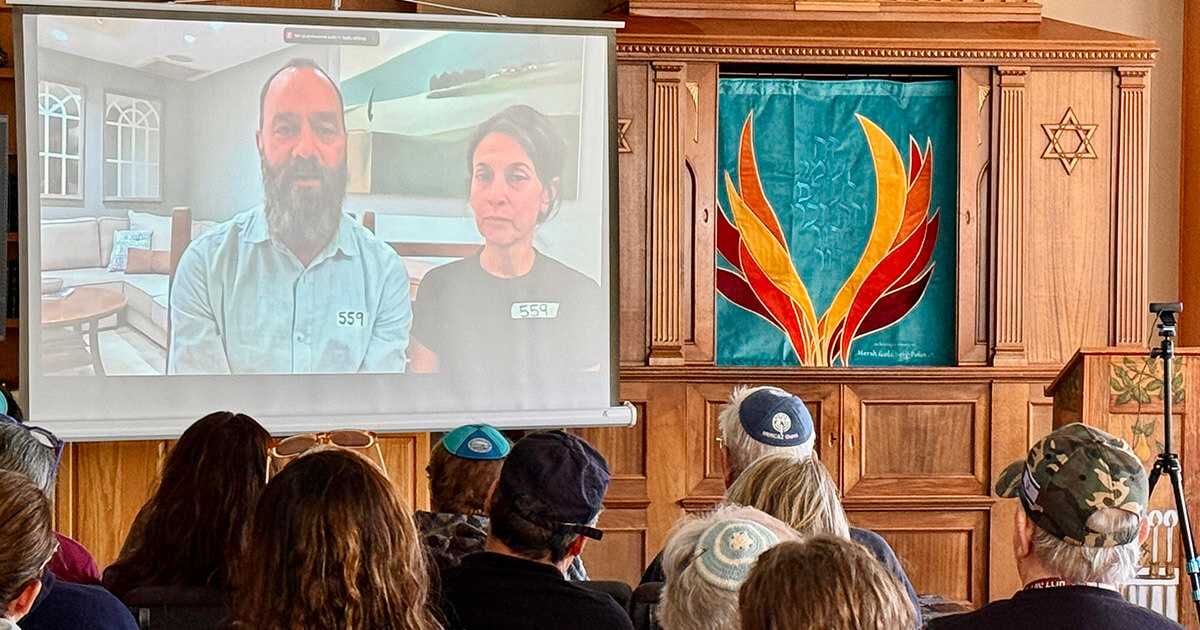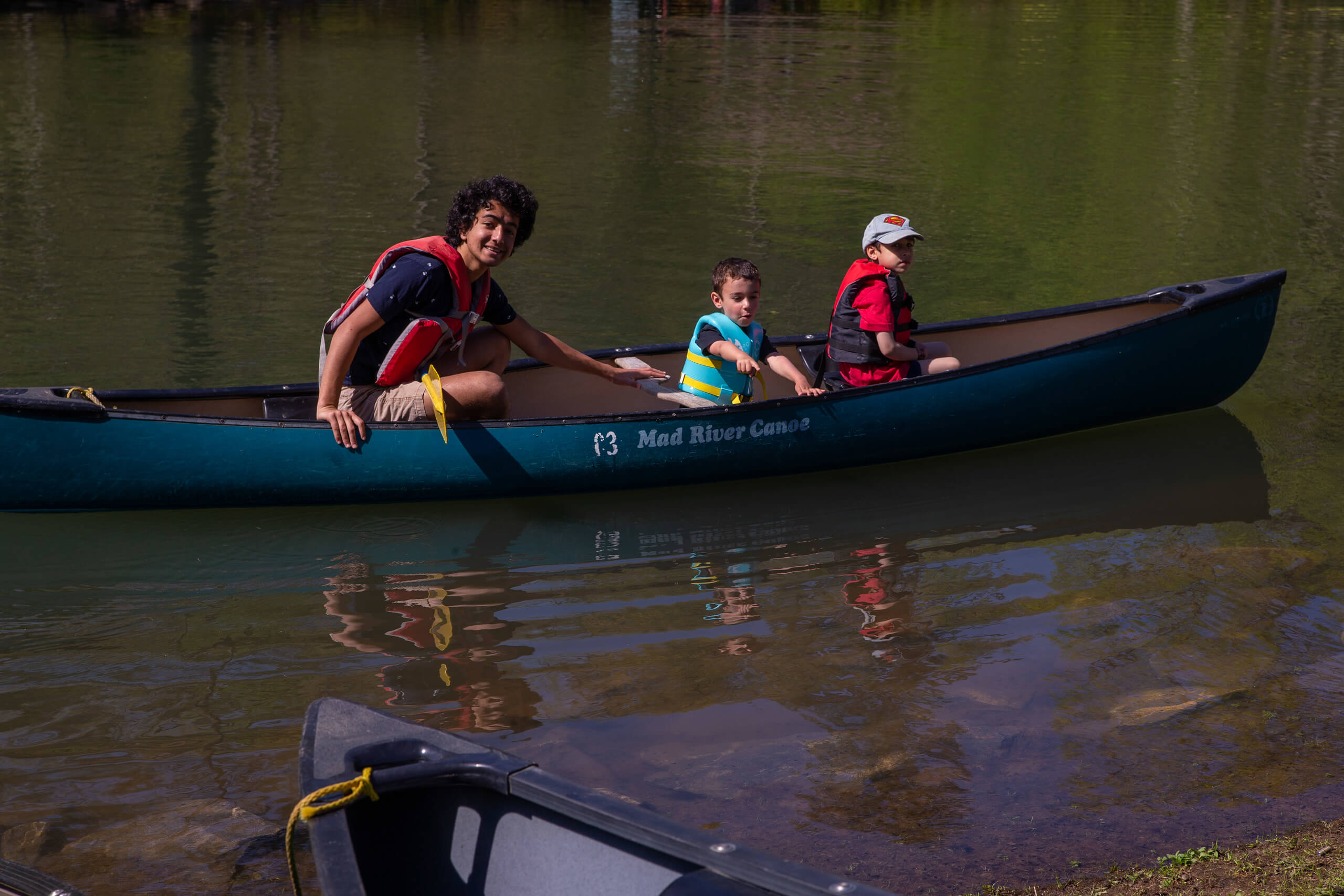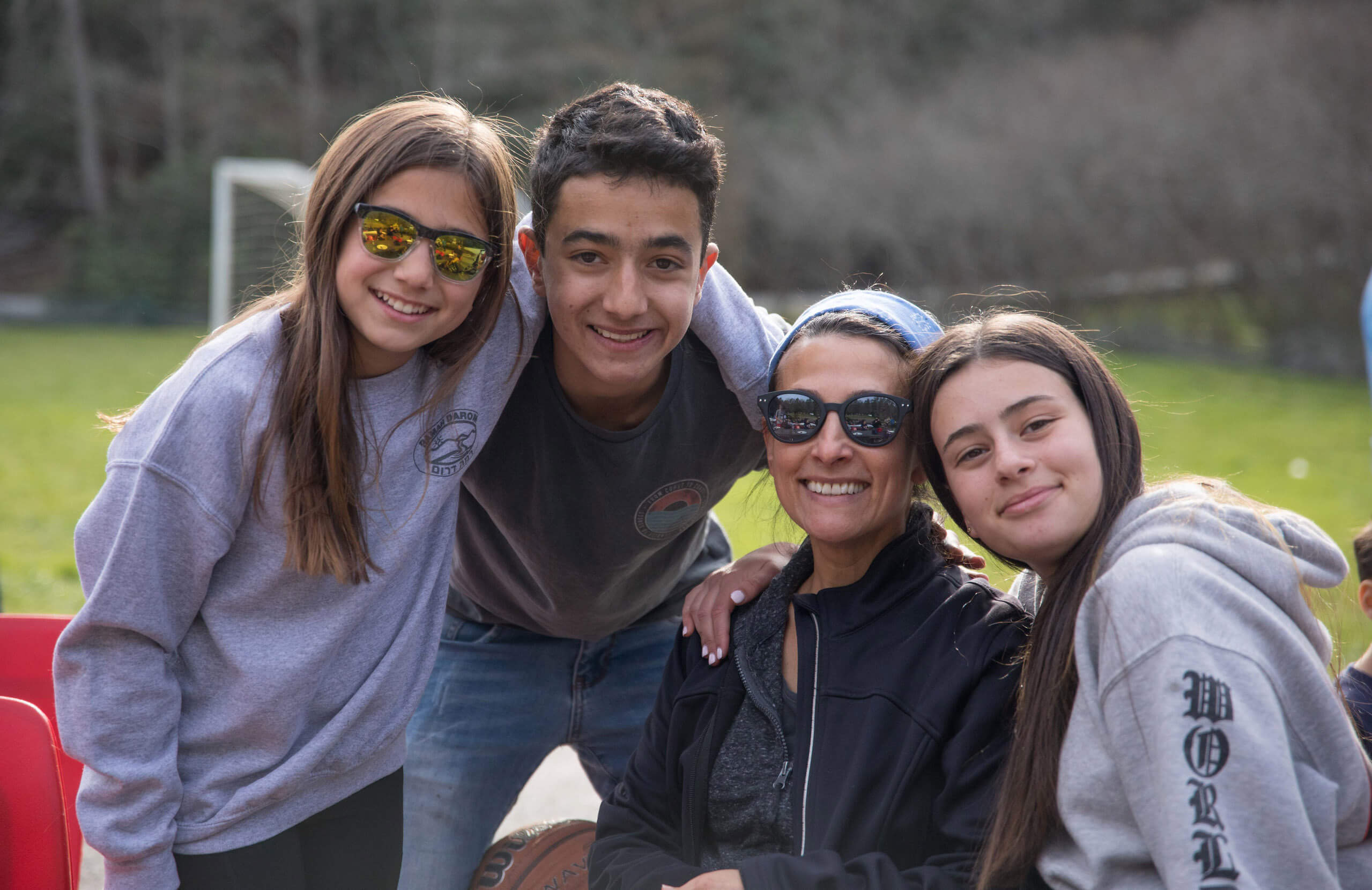Hersh Goldberg-Polin at Camp Ramah Darom’s Passover retreat as a camper on the ropes course, and later as a counselor entertaining children. Courtesy of Camp Ramah Darom
CLAYTON, GEORGIA — On a blue-sky Thursday in the north Georgia mountains, Camp Ramah Darom’s canoes rested and pickleballs sat idle as more than 200 people filed into the sanctuary overlooking the lake to remember Hersh Goldberg-Polin — son, brother, camper, counselor — killed by Hamas after nearly 11 months in captivity.
This Passover was the first without him.
For nearly a decade, Hersh and his family — parents Jon and Rachel, sisters Leebie and Orly — had celebrated the holiday here, alongside grandparents, aunts, uncles and cousins.
“Coming here is like coming home to be with my Passover family,” said Penina Podwol Alexander, attending her 16th retreat. “It’s an amalgamation of milestones, memories, challenges and growth, seeing who was born last year, who suddenly sprouted up, who got a job, who got married — and sadly, whose seat is now empty, but whose echoes never leave this place.”
This year, that empty seat belonged to Hersh.
Inside the sanctuary, the community gathered to dedicate a new parochet — the decorative curtain that hangs in front of the ark — in Hersh’s memory. The light blue fabric was designed by Jerusalem artist and camp alumna Sharon Binder, and embroidered with a verse from Exodus: “This shall be my name forever, this my remembrance for all eternity.” A reminder, said retreat director Eliana Leader, “of the renewed commitment we make to this relationship each time we open this ark.”

Jon and Rachel Goldberg-Polin appeared by video from Florida, where they are spending the holiday with extended family. The screen beside the ark alternated between their faces and photos of Hersh at the Passover retreat through the years — playing basketball on the outdoor court, climbing the rock wall, building “bunk tents” with cousins. “I just remember bringing 10 extra sets of sheets to them,” Leader said with a smile.
This place — more than 100 wooded acres tucked against the Chattahoochee National Forest — had shaped Hersh. He came first as a camper, then a counselor. “He would sit at every davening with his father,” Leader recalled, using the Yiddish word for praying “even when many other kids had left the sanctuary to go and play.”
Now, a number written in marker — 559 — was taped to Jon and Rachel’s shirts, marking the days since the Oct. 7 Nova Festival attack in southern Israel.

Rabbi Joshua Heller, a longtime retreat participant, spoke of the curtain’s symbolism. “There are many separators that we encounter in life,” he said. “Death, it would seem, is the ultimate separator.” But, he added, a separator can also be a bridge. “That was, in a sense, who Hersh was. He was a bridger of worlds between secular and religious, American and Israeli. We’ve heard stories of how he inspired others, even in his captivity.”
Jason Steinberg remembered Hersh from the retreat’s annual “Passover Basketball Decathlon.” “Hersh brought joy, hustle, grit, Energizer Bunny stamina and love to our game.” He was, Steinberg said, “a peacemaker. He wanted to include everyone.”
Steinberg recalled Hersh in younger years, perched on someone’s shoulders, dancing after the Seder as the crowd sang “Next Year in Jerusalem.” On Thursday, Steinberg stood in the sanctuary, pointing to Hersh’s usual seat. Through tears, he said he had named his newborn son after Hersh — one of many children around the world who now bear his name.

Rachel Goldberg-Polin spoke of the birkat kohanim, the priestly blessing. At Ramah Darom, unlike at her usual synagogue in Israel, families are not separated by gender and instead pray together. “The only time in my life that I was blessed with being under Jon’s tallit with all three of my children was in that room that you’re in,” she said, her voice trembling. “Every Shabbat now, here in Israel, during that prayer, I close my eyes and I go back to that seat by the window, and I picture Jon, Hersh, Leebie, Orly and me. That place holds a piece of my heart that I can never replicate, except there.”
Jon remembered the Hallel prayer sung on holidays: “Let’s exalt and be happy on this day.” Every time it was recited, he said, “I would put my arm around Hersh, and I would gesture around the room and out the window, and I would do that annoying dad thing where I would try to get him to focus on how lucky we all were to be with the people we were with in that place.”
As the memorial ended, there were prayers for the 59 remaining hostages.

I hope you appreciated this article. Before you go, I’d like to ask you to please support the Forward.
Now more than ever, American Jews need independent news they can trust, with reporting driven by truth, not ideology. We serve you, not any ideological agenda.
At a time when other newsrooms are closing or cutting back, the Forward has removed its paywall and invested additional resources to report on the ground from Israel and around the U.S. on the impact of the war, rising antisemitism and polarized discourse.
This is a great time to support independent Jewish journalism you rely on. Make a Passover gift today!
— Rachel Fishman Feddersen, Publisher and CEO

